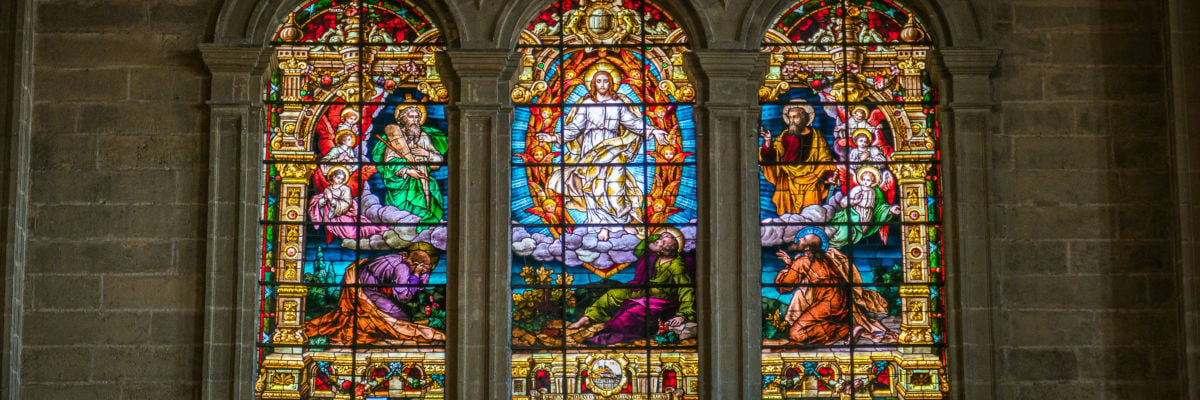
Many Protestant-Christians argue that Christians should use only the Bible as the infallible source of truth. One way they do this is by attacking the ambiguity of Tradition. Catholicism claims that “Tradition” is basically everything that the apostles passed down to their followers orally, rather than through their written letters. Tradition, for Catholics, is just as infallible as the Bible.
But, Protestants contend, Catholicism does not point to any specific examples of Tradition. Scripture is easily consulted by opening the book in our hands, whereas Tradition is less easily consulted. As Protestant apologist Robert Zins said in a debate on Catholicism, “How many of you in here have held Paul’s tradition in your hand? And read it, and studied it, and obeyed it?” His point is that there is no infallible listing of teachings handed on by the apostles orally. Because of this, Protestants argue that Catholicism could simply invent new teachings and claim that they came from this mysterious source of “Tradition.”
To address this claim, I’ve compiled a few teachings that principally derive from Tradition. These teachings are examples of Tradition for two reasons.
First, the earliest Christians sometimes explicitly claim that the specific teaching was handed down from the apostles. If the earliest Christians are trustworthy, then this is a good first criterion.
Second, the earliest Christians sometimes unanimously hold to a specific teaching. If nearly every Christian writer throughout the world teaches the specific teaching or does not dispute it, then this implies that the source of the teaching is the apostles. A teaching would likely be widespread because it was a part of the Tradition. On the other hand, if the teaching was not held by men all over the world, but was just one particular thought from one particular man, then the teaching was likely not an apostolic tradition.
The following teachings of Tradition can be found in Scripture, but only implicitly. Many will debate whether these teachings come from Scripture, but if we know that a given teaching was handed down from the apostles orally, then the debate is cleared up.
Below are seven teachings that meet the above two criteria and thus qualify as specific traditions.
1. Prayer for the Dead. Catholicism teaches that Christians can pray for the souls of the dead, for the dead might be getting purged of their sins before God. Prayer for the speeding up of this after-life purgation comes from the apostles, according to the popular patriarch of Constantinople, St. John Chrysostom (347-407). He said, “Not in vain did the apostles order that remembrance should be made of the dead in the dreadful Mysteries [of the Eucharistic liturgy].” The apostles taught that the prayer of the Mass would refresh the souls of the dead being purified.
2. Infant Baptism. Catholics hold to the teaching that infants, who are incapable of having faith in Jesus, can be baptized. The faith of the Church makes up for the infant’s deficit. This teaching of infant baptism has its origins in the apostles, according to Origen of Alexandria (184-254). He said that the “Church received from the apostles the tradition of giving baptism even to infants” (Commentary on Romans 5:9).
3. The Perpetual Virginity of Mary. This teaching says that Jesus’ mother, Mary, was a virgin her entire life. She never had sexual relations with Joseph. This dogma was universally taught by the early Church, even though there is no Scripture verse that says, “Mary never had relations with Joseph for her entire life.” St. Jerome refuted a man named Helvidius who claimed that Mary had sexual relations, by saying, “Might I not array against you the whole series of ancient writers? . . . Ignatius [A.D. 108], Polycarp [65-155], Irenaeus [130-200], Justin Martyr [100-165], and many other apostolic and eloquent men, who against [the heretics] Ebion, Theodotus of Byzantium, and Valentinus held these same views and wrote volumes replete with wisdom. If you had ever read what they wrote, you would be a wiser man” (19).
4. The Real Presence. Although many Protestants teach that Jesus’ phrase “this is my body” was purely symbolic, Catholicism teaches that Jesus was speaking literally. The bread mystically transformed into the body of Jesus yet remained under the form of bread. This teaching was affirmed by all of the early Church Fathers. The reason nobody doubted or denied it is that the apostles had handed it down.
5. The Sacrifice of the Mass. Catholicism teaches that the Last Supper of Jesus (the first Mass), wherein he offered bread and wine, was truly united to his sacrificial death. All Masses offered by priests are therefore sacrifices to God. Many Protestant Christians deny that the Mass is a sacrifice, yet all of the Church Fathers unanimously taught this. Scripture never says explicitly “the sacrifice of the Mass,” but this teaching is nonetheless a tradition. Church Historian JND Kelly said, “The Eucharist was regarded as the distinctively Christian sacrifice from the closing decade of the first century, if not earlier. . . . It was natural for early Christians to think of the Eucharist as a sacrifice” (196).
6. Apostolic Succession. Catholics teach that bishops need to be ordained from someone with a direct lineage of succession to the apostles. This was never explained in Scripture as a requirement. Yet why did the Church Fathers consider it essential? Probably because it was an apostolic tradition. In fact, heretics who claimed that their doctrines stemmed from the apostles were refuted by Tertullian (160-220), who noted that such heretics did not have lists of their bishops linking them to the apostles (ch. 32).
7. Bishops, Priests, and Deacons. Scripture never says that there are three offices of leadership in the Church: bishops, priests, and deacons. It says only that there are elders or overseers and deacons. Yet St. Ignatius of Antioch spoke of a tripartite governance of orders that already existed for a while and was spread out in the various churches of Asia Minor (Letter to the Trallians 2:1-3). Other early Christians spoke of the same. Where did they get such an idea if not from Tradition? How could they be so confident that every Church had a single bishop above the priests and deacons?
Those who claim that Tradition is just a murky soup of undefined messiness are wrong. Catholics cannot pull doctrines from Tradition, as if from a magician’s hat. Instead, the apostles handed down teachings verbally, and the early Christians attested to them.



